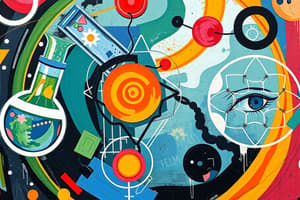Podcast
Questions and Answers
What is the primary focus of natural sciences?
What is the primary focus of natural sciences?
- Study of abstract concepts
- Study of technological applications
- Study of natural phenomena (correct)
- Study of societies and human behavior
Which branch of science is concerned with the study of substances and their interactions?
Which branch of science is concerned with the study of substances and their interactions?
- Physics
- Chemistry (correct)
- Engineering
- Biology
In the scientific method, what comes after formulating a hypothesis?
In the scientific method, what comes after formulating a hypothesis?
- Observation
- Analysis
- Experimentation (correct)
- Conclusion
Which of the following statements best describes a scientific theory?
Which of the following statements best describes a scientific theory?
What is the purpose of peer review in science?
What is the purpose of peer review in science?
Which variable is manipulated by the researcher in an experiment?
Which variable is manipulated by the researcher in an experiment?
What is the significance of reproducibility in scientific research?
What is the significance of reproducibility in scientific research?
Which of the following is NOT a role of science in society?
Which of the following is NOT a role of science in society?
Flashcards are hidden until you start studying
Study Notes
Key Concepts in Science
- Definition: Science is a systematic enterprise that builds and organizes knowledge in the form of testable explanations and predictions about the universe.
Branches of Science
-
Natural Sciences: Study of natural phenomena.
- Physics: Study of matter, energy, and forces.
- Chemistry: Study of substances and their interactions.
- Biology: Study of living organisms and life processes.
-
Social Sciences: Study of societies and human behavior.
- Psychology: Study of the mind and behavior.
- Sociology: Study of social behavior and structures.
- Economics: Study of production, consumption, and transfer of wealth.
-
Formal Sciences: Study of abstract concepts.
- Mathematics: Study of numbers and their relationships.
- Logic: Study of reasoning and argument structure.
-
Applied Sciences: Practical application of scientific knowledge.
- Engineering: Application of science in designing and constructing.
- Medicine: Application of biological sciences for health.
Scientific Method
- Observation: Gathering data and identifying phenomena.
- Hypothesis: Formulating a testable explanation for observations.
- Experimentation: Designing and conducting experiments to test the hypothesis.
- Analysis: Interpreting results to support or refute the hypothesis.
- Conclusion: Drawing conclusions and communicating findings.
Key Principles
- Empiricism: Knowledge should be based on observable phenomena.
- Reproducibility: Scientific findings must be repeatable by others.
- Falsifiability: Hypotheses should be testable and potentially disprovable.
- Peer Review: Process of evaluation by experts to ensure quality and validity.
Important Concepts
-
Theory vs. Law:
- Theory: Broad explanation based on a body of evidence (e.g., Theory of Evolution).
- Law: Statement describing consistent natural phenomena (e.g., Law of Gravity).
-
Variables:
- Independent Variable: Changed by the researcher.
- Dependent Variable: Measured in response to changes.
- Controlled Variables: Kept constant during experimentation.
Science in Society
- Role of Science: Drives technological advancement, informs public policy, and addresses global challenges (e.g., climate change, health crises).
- Ethics in Science: Considerations of moral implications and responsibilities in scientific practices and applications.
Defining Science
- Science is a systematic method of gathering knowledge about the universe through testable explanations and predictions.
Branches of Science
- Natural Sciences: Study of natural phenomena
- Physics: Studies matter, energy, and forces.
- Chemistry: Examines substances and their interactions.
- Biology: Focuses on living organisms and their processes.
- Social Sciences: Study of societies and human behavior.
- Psychology: Examines the mind and human behavior.
- Sociology: Analyzes social behavior and structures.
- Economics: Studies the production, consumption, and transfer of wealth.
- Formal Sciences: Study of abstract concepts.
- Mathematics: Studies numbers and their relationships.
- Logic: Analyzes reasoning and argument structure.
- Applied Sciences: Practical application of scientific knowledge.
- Engineering: Uses scientific principles to design and construct.
- Medicine: Applies biological sciences to human health.
The Scientific Method
- A process encompassing these steps:
- Observation: Gathering data and identifying phenomena.
- Hypothesis: Formulating a testable explanation for observations.
- Experimentation: Designing and conducting experiments to test the hypothesis.
- Analysis: Interpreting results to support or refute the hypothesis.
- Conclusion: Drawing conclusions and communicating findings.
Key Scientific Principles
- Empiricism: Knowledge should be grounded in observable phenomena.
- Reproducibility: Scientific findings must be repeatable by other researchers.
- Falsifiability: Hypotheses should be testable and potentially disprovable.
- Peer Review: Process of evaluation by experts to ensure quality and validity of scientific findings.
Important Concepts in Science
- Theory vs. Law:
- Theory: A broad explanation supported by a large body of evidence (e.g., Theory of Evolution)
- Law: A statement describing consistent natural phenomena (e.g., Law of Gravity)
- Variables:
- Independent Variable: The variable changed by the researcher.
- Dependent Variable: The variable measured in response to changes.
- Controlled Variable: The variables kept constant during experimentation.
Science's Role in Society
- Impact: Drives technological advancement, informs public policy, and addresses global challenges (e.g., climate change, health crises).
- Ethics: Considers the moral implications and responsibilities in scientific practices and applications.
Studying That Suits You
Use AI to generate personalized quizzes and flashcards to suit your learning preferences.




